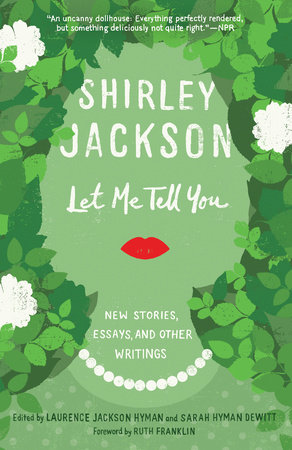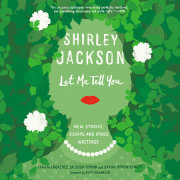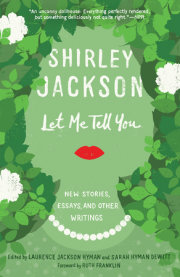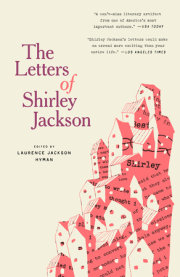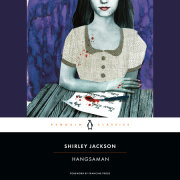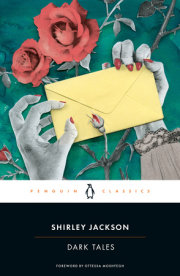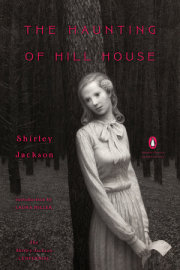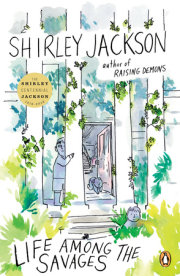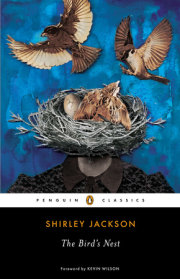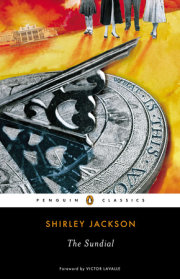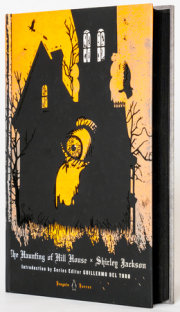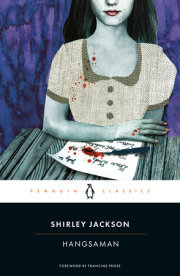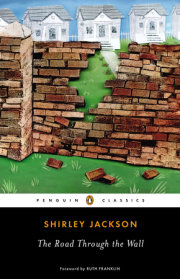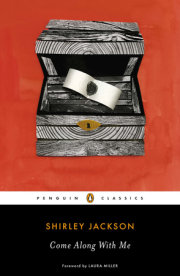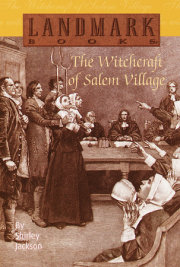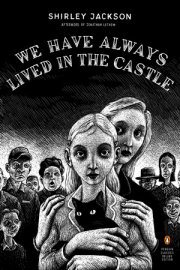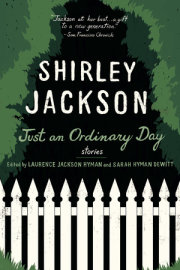Paranoia
Mr. Halloran Beresford, pleasantly tired after a good day in the office, still almost clean-shaven after eight hours, his pants still neatly pressed, pleased with himself particularly for remembering, stepped out of the candy shop with a great box under his arm and started briskly for the corner. There were twenty small-size gray suits like Mr. Beresford’s on every New York block, fifty men still clean-shaven and pressed after a day in an air-cooled office, a hundred small men, perhaps, pleased with themselves for remembering their wives’ birthdays. Mr. Beresford was going to take his wife out to dinner, he decided, going to see if he could get last-minute tickets to a show, taking his wife candy. It had been an exceptionally good day, altogether, and Mr. Beresford walked along swiftly, humming musically to himself.
He stopped on the corner, wondering whether he would save more time by taking a bus or by trying to catch a taxi in the crowd. It was a long trip downtown, and Mr. Beresford ordinarily enjoyed the quiet half hour on top of a Fifth Avenue bus, perhaps reading his paper. He disliked the subway intensely, and found the public display and violent exercise necessary to catch a taxi usually more than he was equal to. However, tonight he had spent a lot of time waiting in line in the candy store to get his wife’s favorite chocolates, and if he was going to get home before dinner was on the table he really had to hurry a little.
Mr. Beresford went a few steps into the street, waved at a taxi, said “Taxi!” in a voice that went helplessly into a falsetto, and slunk back, abashed, to the sidewalk while the taxi went by uncomprehending. A man in a light hat stopped next to Mr. Beresford on the sidewalk, and for a minute, in the middle of the crowd, he stared at Mr. Beresford and Mr. Beresford stared at him as people sometimes do without caring particularly what they see. What Mr. Beresford saw was a thin face under the light hat, a small mustache, a coat collar turned up. Funny-looking guy, Mr. Beresford thought, lightly touching his own clean-shaven lip. Perhaps the man thought Mr. Beresford’s almost unconscious gesture was offensive; at any rate he frowned and looked Mr. Beresford up and down before he turned away. Ugly customer, Mr. Beresford thought.
The Fifth Avenue bus Mr. Beresford usually took came slipping up to the corner, and Mr. Beresford, pleased not to worry about a taxi, started for the stop. He had reached out his hand to take the rail inside the bus door when he was roughly elbowed aside and the ugly customer in the light hat shoved on ahead of him. Mr. Beresford muttered and started to follow, but the bus door closed on the packed crowd inside, and the last thing Mr. Beresford saw as the bus went off down the street was the man in the light hat grinning at him from inside the door.
“There’s a dirty trick,” Mr. Beresford told himself, settling his shoulders irritably in his coat. Still under the influence of his annoyance, he ran a few steps out into the street and waved again at a taxi, not trusting his voice, and was almost run down by a delivery truck. As Mr. Beresford skidded back to the sidewalk, the truck driver leaned out and yelled something unrecognizable at Mr. Beresford, and when Mr. Beresford saw the people around him on the corner laughing he decided to start walking downtown; in two blocks he would reach another bus stop, a good corner for taxis, and a subway station; much as Mr. Beresford disliked the subway, he might still have to take it, to get home in any sort of time. Walking downtown, his candy box under his arm, his gray suit almost unaffected by the crush on the corner, Mr. Beresford decided to swallow his annoyance and remember that it was his wife’s birthday; he began to hum again as he walked.
He watched the people as he walked along, his perspective sharpened by being a man who had just succeeded in forgetting an annoyance; surely the girl in the very high-heeled shoes, coming toward him with a frown on her face, was not so able to put herself above petty trifles, or maybe she was frowning because of the shoes; the old lady and man looking at the shop windows were quarreling. The funny-looking guy in the light hat coming quickly through the crowd looked as though he hated someone . . . the funny-looking guy in the light hat; Mr. Beresford turned clean around in the walking line of people and watched the man in the light hat turn abruptly and start walking downtown, about ten feet in back of Mr. Beresford. What do you know about that?, Mr. Beresford marveled, and began to walk a little more quickly. Probably got off the bus for some reason; wrong bus, maybe. Then why would he start walking uptown instead of catching another bus where he was? Mr. Beresford shrugged and passed two girls walking together and talking both at once.
Halfway from the corner he wanted, Mr. Beresford realized with a sort of sick shock that the man in the light hat was at his elbow, walking steadily along next to him. Mr. Beresford turned his head the other way and slowed his step. The other man slowed down as well, without looking at Mr. Beresford.
Nonsense, Mr. Beresford thought, without troubling to work it out any further than that. He settled his candy box firmly under his arm and cut abruptly across the uptown line of people and into a shop; a souvenir and notions shop, he realized as he came through the door. There were a few people inside—a woman and a little girl, a sailor—and Mr. Beresford retired to the far end of the counter and began to fuss with an elaborate cigarette box on which was written souvenir of new york city, with the Trylon and the Perisphere painted beneath.
“Isn’t this cute?” the mother said to the little girl, and they both began to laugh enormously over the match holder made in the form of a toilet; the matches were to go in the bowl, and on the cover, Mr. Beresford could see, were the Trylon and the Perisphere, with souvenir of new york city written above.
The man in the light hat came into the shop, and Mr. Beresford turned his back and busied himself picking up one thing after another from the counter; with half his mind he was trying to find something that did not say souvenir of new york city, and with the other half of his mind he was wondering about the man in the light hat. The question of what the man in the light hat wanted was immediately subordinate to the question of whom he wanted; if his light-hatted designs were against Mr. Beresford they must be nefarious, else why had he not announced them before now? The thought of accosting the man and demanding his purpose crossed Mr. Beresford’s mind fleetingly, and was succeeded, as always in an equivocal situation, by Mr. Beresford’s vivid recollection of his own small size and innate cautiousness. Best, Mr. Beresford decided, to avoid this man. Thinking this, Mr. Beresford walked steadily toward the doorway of the shop, intending to pass the man in the light hat and go out and catch his bus home.
He had not quite reached the man in the light hat when the shop’s clerk came around the end of the counter and met Mr. Beresford with a genial smile and a vehement “See anything you like, mister?”
“Not tonight, thanks,” Mr. Beresford said, moving left to avoid the clerk, but the clerk moved likewise and said, “Got some nice things you didn’t look at.”
“No, thanks,” Mr. Beresford said, trying to make his tenor voice firm.
“Take a look,” the clerk insisted. This was unusually persistent even for such a clerk; Mr. Beresford looked up and saw the man in the light hat on his right, bearing down on him. Over the shoulders of the two men he could see that the shop was empty. The street looked very far away, the people passing in either direction looked smaller and smaller; Mr. Beresford realized that he was being forced to step backward as the two men advanced on him.
“Easy does it,” the man in the light hat said to the clerk. They continued to move forward slowly.
“See here, now,” Mr. Beresford said, with the ineffectuality of the ordinary man caught in such a crisis; he still clutched his box of candy under his arm. “See here,” he said, feeling the solid weight of the wall behind him.
“Ready,” the man in the light hat said. The two men tensed, and Mr. Beresford, with a wild yell, broke between them and ran for the door. He heard a sound more like a snarl than anything else behind him and the feet coming after him. I’m safe on the street, Mr. Beresford thought as he went through the door into the line of people; as long as there are lots of people, they can’t do anything to me. He looked back, walking downtown between a fat woman with many packages and a girl and a boy leaning on each other’s shoulders, and he saw the clerk standing in the doorway of the shop looking after him; the man in the light hat was not in sight. Mr. Beresford shifted the box of candy so that his right arm was free, and thought, Perfectly silly. It’s still broad daylight. How they ever hoped to get away with it . . .
The man in the light hat was on the corner ahead, waiting. Mr. Beresford hesitated in his walk and then thought, It’s preposterous, all these people watching. He walked boldly down the street; the man in the light hat was not even watching him, but was leaning calmly against a building lighting a cigarette. Mr. Beresford reached the corner, darted quickly into the street, and yelled boisterously “Taxi!” in a great voice he had never suspected he possessed until now. A taxi stopped as though not daring to disregard that great shout, and Mr. Beresford moved gratefully toward it. His hand was on the door handle when another hand closed over his, and Mr. Beresford was aware of the light hat brushing his cheek.
“Come on if you’re coming,” the taxi driver said; the door was open, and Mr. Beresford, resisting the push that urged him into the taxi, slipped his hand out from under the other hand and ran back to the sidewalk. A crosstown bus had stopped on the corner, and Mr. Beresford, no longer thinking, hurried onto it, dropped a nickel into the coin register, and went to the back of the bus and sat down. The man in the light hat sat a little ahead, between Mr. Beresford and the door. Mr. Beresford put his box of candy on his lap and tried to think. Obviously the man in the light hat was not carrying a grudge all this time about Mr. Beresford’s almost unconscious gesture toward his mustache, unless he was peculiarly sensitive. In any case, there was also the clerk in the souvenir shop; Mr. Beresford realized suddenly that the clerk in the souvenir shop was a very odd circumstance indeed. Mr. Beresford set the clerk aside to think about later and went back to the man in the light hat. If it was not the insult to the mustache, what was it? And then another thought caught Mr. Beresford breathless: How long, then, had the man in the light hat been following him? He thought back along the day: He had left his office with a group of people, all talking cheerfully, all reminding Mr. Beresford that it was his wife’s birthday; they had escorted Mr. Beresford to the candy shop and left him there. He had been in his office all day except for lunch with three fellows in the office; Mr. Beresford’s mind leaped suddenly from the lunch to his first sight of the man in the light hat at the bus stop; it seemed that the man in the light hat had been trying to push him onto the bus and into the crowd, instead of pushing in ahead. In that case, once he was on the bus . . . Mr. Beresford looked around. In the bus he was riding on now there were only five people left. One was the driver, one Mr. Beresford, one the man in the light hat, sitting slightly ahead of Mr. Beresford. The two others were an old lady with a shopping bag and a man who looked as though he might be a foreigner. Foreigner, Mr. Beresford thought, while he looked at the man. Foreigner, foreign plot, spies. Better not rely on any foreigner, Mr. Beresford thought.
The bus was going swiftly along between high dark buildings. Mr. Beresford, looking out the window, decided that they were in a factory district, remembered that they had been going east, and decided to wait until they got to one of the lighted, busy sections before he tried to get off. Peering off into the growing darkness, Mr. Beresford noticed an odd thing. There had been someone standing on the corner beside a sign saying bus stop and the bus had not stopped, even though the dim figure waved its arms. Surprised, Mr. Beresford glanced up at the street sign, noticing that it said e. 31 st. at the same moment he reached for the cord to signal the driver that he wanted to get off. As he stood up and went down the aisle, the foreign-looking man rose also and went to the door beside the driver. “Getting off,” the foreign man said, and the bus slowed. Mr. Beresford pressed forward, and somehow the old lady’s shopping bag got in his way and spilled, sending small items, a set of blocks, a package of paper clips, spilling in all directions.
“Sorry,” Mr. Beresford said desperately as the bus doors opened. He began to move forward again, and the old lady caught his arm and said, “Don’t bother if you’re in a hurry. I can get them, dear.” Mr. Beresford tried to shake her off, and she said, “If this is your stop, don’t worry. It’s perfectly all right.”
A coil of pink ribbon was caught around Mr. Beresford’s shoe; the old lady said, “It was clumsy of me, leaving my bag right in the aisle.”
As Mr. Beresford broke away from her, the doors closed and the bus started. Resigned, Mr. Beresford got down on one knee in the swaying bus and began to pick up paper clips, blocks, a box of letter paper that had opened and spilled sheets and envelopes all over the floor. “I’m so sorry,” the old lady said sweetly. “It was all my fault, too.”
Over his shoulder, Mr. Beresford saw the man in the light hat sitting comfortably. He was smoking, and his head was thrown back and his eyes were shut. Mr. Beresford gathered together the old lady’s possessions as well as he could, then made his way forward to stand by the driver. “Getting off,” Mr. Beresford said.
Copyright © 2015 by Shirley Jackson. All rights reserved. No part of this excerpt may be reproduced or reprinted without permission in writing from the publisher.

